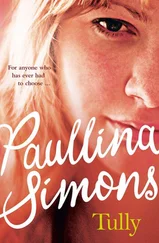PAULLINA SIMONS
THE SUMMER
GARDEN


HarperCollins Publishers Ltd.
1 London Bridge Street
London SE1 9GF
www.harpercollins.co.uk
First published in Great Britain by HarperCollins Publishers 2006
Copyright © Paullina Simons 2005
Besame Mucho Written by Consuelo Velasquez © 1941 & 1943 P.H.A.M., Mexico Latin-American Music Pub. Co. Ltd, London. Used by permission
Paullina Simons asserts the moral right to be identified as the author of this work
A catalogue record for this book is available from the British Library
This novel is entirely a work of fiction. The names, characters and incidents portrayed in it are the work of the author’s imagination. Any resemblance to actual persons, living or dead, events or localities is entirely coincidental.
All rights reserved under International and Pan-American Copyright Conventions. By payment of the required fees, you have been granted the non-exclusive, non-transferable right to access and read the text of this ebook on screen. No part of this text may be reproduced, transmitted, downloaded, decompiled, reverse-engineered, or stored in or introduced into any information storage and retrieval system, in any form or by any means, whether electronic or mechanical, now known or hereafter invented, without the express written permission of HarperCollins ebooks
HarperCollins Publishers has made every reasonable effort to ensure that any picture content and written content in this ebook has been included or removed in accordance with the contractual and technological constraints in operation at the time of publication
Source ISBN: 9780007162499
Ebook Edition © MARCH 2015 ISBN: 9780007390816
Version: 2017-09-25
For Kevin, my own mystic guide
By the rivers of Babylon, there we sat down,Yea, we wept, when we remembered Zion.We hanged our harps upon the willows in the midst …For there, they that carried us awaycaptive required of us a song,And they that wasted us required of us mirth, saying,Sing us one of the songs of Zion.How shall we sing the Lord’s song in a strange land?Psalm 137
The song of songs, which is Solomon’s.The Song of Solomon
Cover
Title Page
Copyright
Dedication
Epigraph
Book One: The Land of Lupine and Lotus
Chapter One: Deer Isle, 1946
Chapter Two: Coconut Grove, 1947
Chapter Three: Paradise Valley, 1947
Chapter Four: Vianza, 1947
Chapter Five: Bethel Island, 1948
Chapter Six: Jane Barrington, 1948
First Interlude: Saika Kantorova, 1938
Pasha
Book Two: Ithaca
Chapter Seven: Conjugal Compromises
Chapter Eight: The House that Balkman Built
Second Interlude: The Queen of Spades
Cousin Marina
Book Three: Dissonance
Chapter Nine: The Five-Year Plan
Chapter Ten: Blockade Girl
Chapter Eleven: Blue Christmas
Chapter Twelve: Gone Astray
Chapter Thirteen: The Summer Garden
Book Four: Moon Lai
Chapter Fourteen: The Man on the Moon
Chapter Fifteen: The Queen of Lake Ilmen
Chapter Sixteen: In the Heart of Vietnam
Chapter Seventeen: Kings and Heroes
Chapter Eighteen: Crossroads
Coda
One
Two
Three
Keep Reading
About the Author
Also by the Author
About the Publisher
BOOK ONE THE LAND OF LUPINE AND LOTUS
The Lotos blooms below the barren peakThe Lotos blows by every winding creek …Let us swear an oath, and keep it with an enqual mind,In the hollow Lotos-land to live and lie reclinedOn the hills like gods together, careless of mankind.
ALFRED, LORD TENNYSON
CHAPTER ONE
Deer Isle, 1946
The Carapace
Carapace n. a thick hard case or shell made of bone or chitin that covers part of the body of an animal such as a lobster.
Once upon a time, in Stonington, Maine, before sunset, at the end of a hot war and the beginning of a cold one, a young woman dressed in white, outwardly calm but with trembling hands, sat on a bench by the harbor, eating ice cream.
By her side was a small boy, also eating ice cream, his a chocolate. They were casually chatting; the ice cream was melting faster than the mother could eat it. The boy was listening as she sang “Shine Shine My Star” to him, a Russian song, trying to teach him the words, and he, teasing her, mangled the verses. They were watching for the lobster boats coming back. She usually heard the seagulls squabbling before she saw the boats themselves.
There was the smallest breeze, and her summer hair moved slightly about her face. Wisps of it had gotten out of her long thick braid, swept over her shoulder. She was blonde and fair, translucent-skinned, translucent-eyed, freckled. The tanned boy had black hair and dark eyes, and chubby toddler legs.
They seemed to sit without purpose, but it was a false ease. The woman was watching the boats in the blue horizon single-mindedly. She would glance at the boy, at the ice cream, but she gawped at the bay as if she were sick with it.
Tatiana wants a drink of herself in the present tense, because she wants to believe there is no yesterday, that there is only the moment here on Deer Isle—one of the long sloping overhanging islands off the coast of central Maine, connected to the continent by a ferry or a thousand-foot suspension bridge, over which they came in their RV camper, their used Schult Nomad Deluxe. They drove across Penobscot Bay, over the Atlantic and south, to the very edge of the world, into Stonington, a small white town nested in the cove of the oak hills at the foot of Deer Isle. Tatiana—trying desperately to live only in the present—thinks there is nothing more beautiful or peaceful than these white wood houses built into the slopes on narrow dirt roads overlooking the expanse of the rippling bay water that she watches day in and day out. That is peace. That is the present. Almost as if there is nothing else.
But every once in a heartbeat while, as the seagulls sweep and weep, something intrudes, even on Deer Isle.
That afternoon, after Tatiana and Anthony had left the house where they were staying to come to the bay, they heard loud voices next door.
Two women lived there, a mother and a daughter. One was forty, the other twenty.
“They’re fighting again,” said Anthony. “You and Dad don’t fight.”
Fight!
Would that they fought.
Alexander didn’t raise a semitone of his voice to her. If he spoke to her at all, it was never above a moderated deep-well timbre, as if he were imitating amiable, genial Dr. Edward Ludlow, who had been in love with her back in New York—dependable, steady, doctorly Edward. Alexander, too, was attempting to acquire a bedside manner.
To fight would have required an active participation in another human being. In the house next door, a mother and daughter raged at each other, especially at this time in the afternoon for some reason, screaming through their open windows. The good news: their husband and father, a colonel, had just come back from the war. The bad news: their husband and father, a colonel, had just come back from the war. They had waited for him since he left for England in 1942, and now he was back.
Читать дальше














